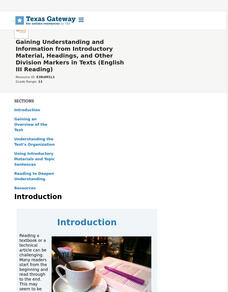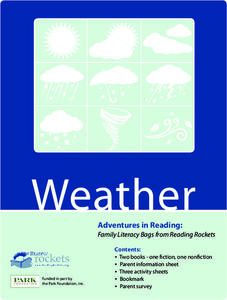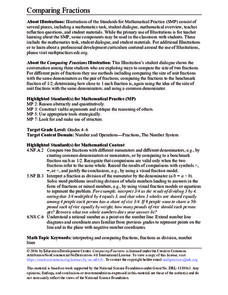Texas Education Agency (TEA)
Gaining Understanding and Information from Introductory Material, Headings, and Other Division Markers in Texts (English III Reading)
All teachers are teachers of reading! The 13-part interactive series ends with a lesson that teaches learners (and their instructors) how to approach reading their textbooks. After learning about several strategies, users test their...
Newspaper Association of America
Cereal Bowl Science and Other Investigations with the Newspaper
What do cereal, fog, and space shuttles have to do with newspapers? A collection of science investigations encourage critical thinking using connections to the various parts of the newspaper. Activities range from building origami seed...
National Park Service
Hibernation-Migration-Fascination
What's the difference between hibernation and a good nap? Find out with an engaging life science activity that compares the hibernation habits of grizzly bears and marmots. After learners read an informational passage about each mammal,...
College Board
The Departure
Scholars learn about the Hero's Journey as they read Ray Bradbury's "The Drummer Boy of Shiloh." They analyze the story's structure and narrative techniques. Finally, they write summaries of the text's central idea and use their...
PBS
Reading Adventure Pack: Weather
A reading adventure pack, featuring a fiction and nonfiction book focuses on the weather. Scholars read Cloudy with a Chance of Meatballs by Judi Barrett and Seymour Simon and then complete three creative activities. Participants craft...
Baylor College
What Makes Water Special?
Get close up and personal with a drop of water to discover how the polarity of its molecules affect its behavior. Elementary hydrologists split and combine water droplets, and also compare them to drops of oil. Much neater than placing a...
Baylor College
Water: Post-Assessment
Very simply, the science class will discuss what they have learned during The Science of Water unit and take a multiple-choice post-assessment quiz. A few other closing activities are suggested for you to choose from, such as having...
Howard Hughes Medical Institute
Classroom Activities: Stem Cells and Diabetes
How close are we to a cure for diabetes? It seems the cure which has a connection to stem cell research is a possibility! Learners explore the concept of stem cells with an engaging hands-on activity. A PowerPoint presentation provides...
Teach Engineering
Quantum Dots and the Harkess Method
The Fantastic Voyage is becoming close to reality. The class reads an article on the use of nanotechnology in the medical field and participate in a discussion about what they read. The discussion method helps class members become more...
Michigan Farm Bureau
The Little Red Hen
No one will be saying "Not I" with a lesson that combines The Little Red Hen with the life cycle of a wheat stem! After reading the story in your class, pass out wheat stems to your learners and have them examine the plants closely,...
Computer Science Unplugged
Sharing Secrets—Information Hiding Protocols
Did you know that you can find the average age of a group of people without anyone having to real their age? This resource provides directions for way to do just that. After the activity, class members read a short passage...
National Park Service
Who Grows There?
More than 127 non-native species live in Glacier National Park in Montana and their infestations are growing! Pupils read about and gather samples of exotic plants. Participants create a master book of pressed plants and complete a...
National Park Service
It Was a Very Good Year
Waterton-Glacier International Peace Park includes whitebark pines that are over 1,200 years old, meaning they have been there since before medieval times. The second lesson of five details how to read tree rings for climate change and...
Howard Hughes Medical Institute
Stalking the Genetic Basis of a Trait
Need an a-maize-ing lesson to show your class how regulatory genes work? If you use the well-written resource, they'll be all ears! Biology scholars discover the gene responsible for the evolution of the modern-day corn plant through a...
National Park Service
Leave it to Beavers
Many people know cats mark their territories by rubbing the back of their necks to leave a scent, but not many people know beavers also leave a scent to mark their territories. During the first activity of two, scholars use their noses...
Rainforest Alliance
Sounds of the Rainforest
Do you hear what I hear? Encourage scholars to use their listening skills and participate in a series of activities that demonstrate how the sense of hearing is crucial to the human and animal world. Activities guide learners...
National Park Service
Subalpine Web
The theory of keystone species in an ecosystem was first established in 1969 by Robert T. Paine. Pupils open the final lesson in a five-part series with a game guessing which member of the alpine ecosystem they are based on clues. After...
Wild BC
Climate Change Bingo
Here is a 20-box bingo card to use when exploring ways that humans impact the environment. Various environmentally aware activities are listed in the boxes, and learners circulate the room to find someone who practices the different...
Education Development Center
Comparing Fractions
Three heads are better than one. After reading a conversation between three friends about how to compare fractions, scholars analyze and discuss each presented strategy. These include using unit fractions, using benchmark fractions,...
National Park Service
The Secret of Life
Dead trees provide nutrients for the soil, food for animals, protection and a home for organisms, a seed-bed for new trees, and a place for nitrogen-fixing bacteria to live. In the activity, pupils collect decaying logs, expose them to a...
New South Wales Department of Education
History of Plant Classification
Bamboo, the fastest growing plant in the world, can grow up to 35 inches in one day! Pupils learn how plants historically have been classified and determine if these traits are appropriate to use in this 17th lesson of 20. They will also...
Science Matters
Formative Assessment #2
Learners work collaboratively to predict what life would be like as an Arctic Hare. Teams go on a hunt where scholars role play an owl, white hares, and gray hares. Independently, pupils record their findings and reflect on their...
Museum of Science
Balloon Racers
Watch those balloon cars go! Scholars build racers that run using the power of balloons and conduct races with the cars. They learn about Newton's third law of motion and how it applies to their balloon racers.
National Park Service
A Peace Park
Piece together American and Canadian culture by learning about peace parks! Scholars discuss differences between Waterton Lakes National Park and Glacier National Park as a group. The newly-informed pupils answers questions about this...























